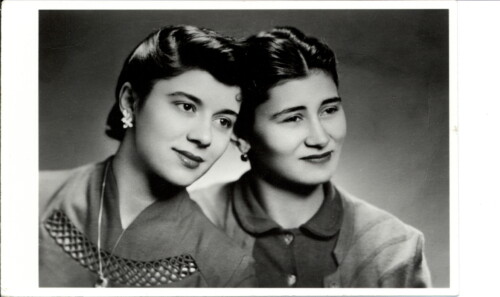
Hilda Laníková
Hilda Laníková, née Ondrášová, born 1936 in Prostějov
-
Testimony abstract
The family of Hilda Laníková, née Ondrášová, lived in their own house in the village of Tvorovice. Her father, Jan Ondráš, worked as a day labourer in Kojetín, while her mother, Marie Ondrášová, was a housewife and took care of fourteen children.
Hilda's father was the first of the family to be arrested in the spring of 1942. He was taken to Auschwitz concentration camp and the family never saw him again. This left her mother alone to care for her large family and dependent on occasional work and support from the community. In the autumn of 1942, the whole family was interned in the so-called Gypsy Camp at Hodonín u Kunštátu.
Hilda was a little girl at the time, so she remembers mainly the constant hunger and the bad food. She said that all the prisoners had to work, not only the adults but also the bigger children; she remembers that they were building roads and breaking up stones. There were pits in the woods around the camp that served as mass graves. The guards were Czech gendarmes; some were brutal and beat the prisoners with truncheons, others treated them decently. In this connection, she remembered Wyroba,[1] who was in charge of the sick-bay. Hilda's older sister Marie Ondrášová, called Květa,[2] with whom Wyroba fell in love, also helped out there. With his help, part of the family was saved from being transported to the concentration camp in Auschwitz. When the closure of the camp and the transport to Auschwitz were imminent,[3] Hilda, her mother and her siblings Marie-Květa, Marie, Alois, Berta, Antonín, František and Helena were very weak after contracting typhoid fever, so Wyroba left them in the sick bay together with several other prisoners who were also recovering from the illness. Some of these remaining prisoners were eventually taken to Auschwitz,[4] but some – including the Ondráš family – were labelled non-Roma and released.
Her father probably did not survive his imprisonment in Auschwitz – and there is also no record of what happened to Hilda's siblings Tomáš, Nanynka and four others, who did not get typhus in Hodonín and so had to be transported to Auschwitz; it is not known where they died.
The family members who were released returned to Tvorovice. With the help of their neighbours, they survived until the end of the war.
- [1] After 1945, the office clerk Miroslav Wyroba worked for what was then the National Security Corps in Frývaldov, today Jeseník. (ed.)
- [2] She helped as a midwife, even though she had not passed any exams, and out of necessity baptized babies born in the camp hospital. (ed.)
- [3] Transport of 22 August 1943. (ed.)
- [4] Transport of 28 January 1944. (ed.)
How to cite abstract
Abstract of testimony from: NEČAS, Ctibor, ed. Nemůžeme zapomenout = Našťi bisteras : nucená táborová koncentrace ve vyprávěních romských pamětníků. Olomouc: Univerzita Palackého, 1994, 178-179. Testimonies of the Roma and Sinti. Project of the Prague Forum for Romani Histories, https://www.romatestimonies.com/testimony/hilda-lanikova-roz-ondrasova (accessed 4/19/2025) -
Origin of Testimony
A record of the narration was made by Ctibor Nečas on July 1, 1987.
-
Where to find this testimony




